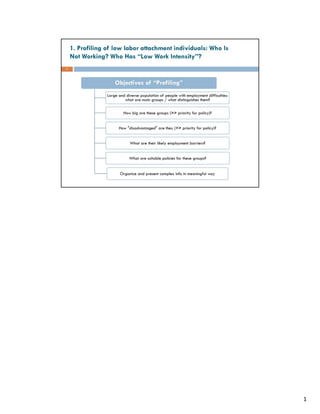More Related Content
Similar to Lv profiling with notes
Similar to Lv profiling with notes (20)
Lv profiling with notes
- 11. These numbers are household rather than individual recipient numbers.
We find that since the start of the crisis, singles without children represent the largest fraction of
recipient households in all municipalities, followed by single parents with 1‐2 kids and couples
without or with 1‐2 kids. The proportion of households with more than 2 kids is very low in all
municipalities. A strong rise in the share of singles without kids since the start of the observation
period is observed for Riga. We moreover find a large increase in non‐employable individuals in
early 2008, which however disappears again during the crisis.
The analysis is based on information the SOPA data base, which contains micro‐level data on receipt
of GMI, housing benefits, and ‘other benefits’ for 109 Latvian municipalities and 9 cities (Kandava
municipality is the only missing municipality). The SOPA system was rolled out in Latvian
municipalities from 2005 at different times and we use data for the seven municipalities / cities for
which we find that the SOPA data are complete enough since the year 2006. The basis for this
selection is a comparison of the figures we calculate using the SOPA with the aggregate figures
provided by the Ministry of Welfare. We do not use any data for the year 2005 because for this
year, we do not have any comparison data. Our observation period is thus 1/2006 to 7/2012, i.e. 91
monthly waves.
The criterion we use for determining data quality is that the deviation of the number we calculate
from official figures should be smaller than 20%. For Jurmala, Riga, and Valmiera, data quality is
best and deviations are below 10% in all years; Ventspils and Liepaja have in some years deviations
between 10‐15% or 15‐20%, respectively; there is a deviation of more than 20% in one single year
for Preili municipality (2009) and Rezekne (2010), but we include these nonetheless. For most
other municipalities, data of sufficient quality is only available for 2010 or 2011.
11
